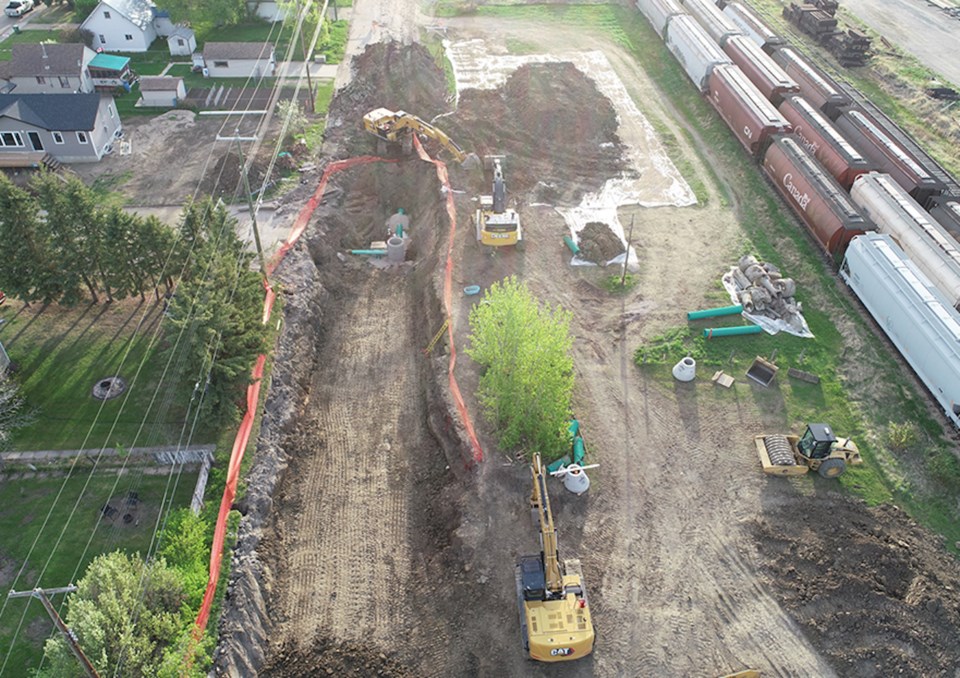WESTLOCK – The remainder of the two-year, $7.3-million 108th Street reconstruction project has been pushed to 2023, with the Town of Westlock citing ongoing negotiations with Imperial Oil regarding remediation costs for a contaminated portion of the road as the reason for the delay.
CAO Simone Wiley said March 30 that the rest of the project, which started April 6, 2021, and included a fresh asphalt overlay, new curbs, gutters and sidewalks, as well as a new storm sewer line, sanitary sewer line and sanitary water line for the entire stretch, “isn’t going to happen in 2022.” Town operations director Robin Benoit said March 31 that about around 80 per cent of the job is done.
“There just won’t be enough time between finishing the negotiations with Imperial Oil, finding out where that leaves us financially and then going ahead and getting into the contractor’s schedule,” said Wiley.
The 2022 work is budgeted at $713,164 and was included in this year’s capital budget — Wiley said those dollars will eventually be rolled over into the 2023 budget.
“We halted last fall because we didn’t want to leave a portion of the road open or unfinished. The intent is that as soon as we can, we will finish off the remaining works,” said Benoit.
“Heavy concentrations of hydrocarbons”
Soon after it started, the project stalled following the discovery of “heavy concentrations of hydrocarbons” from a long-since shuttered Imperial Oil fuel site.
To deal with the pollution, tons of contaminated soil had to be trucked away, while a plastic liner was installed underground to contain any possible further seepage — work started at the end of last May and wrapped before Canada Day.
Imperial Oil, the owners of the 300-by-94-foot lot on the southern side of 108th Street in Whissellville from where the contamination emanated, were being billed for the clean-up and had been invoiced $782,498.31 as of June 2021. The site, which is located about two lots west of where 98th Avenue begins, was decommissioned in 1987 and previously housed an Imperial Oil office, tanks and warehouse. An initial estimate for the clean-up work was pegged at $1.6 million — last June, councillors voted 7-0 to amend the 2021 capital budget and added $1.6 million for remediation costs.
“I can’t say a whole lot in terms of our discussions with Imperial Oil because we don’t want to cloud that conversation. But it’s ongoing and we’re still talking, so that is good,” said Wiley March 30.
No health risks, say province and Imperial
Imperial’s public and government affairs manager Keri Scobie said via e-mail July 7, 2021, that their environmental consultants have conducted site assessments over the years and the data collected “does not indicate a risk to public health and safety, or the environment associated with Imperial’s past operations.”
The north side of 108th Street, heading east from 97th Avenue to 98th Avenue, includes an apartment building, plus the backyards of homes, while the CN Rail line runs parallel to the entire length of 108th Street.
Alberta Environment and Parks confirmed a similar assessment regarding risk to residences in the Whissellville area, stating in a July 5, 2021, e-mail that contamination limits have been defined on the north side of the roadway and “are not expected to cause concern or issue to nearby residential properties” and that they’ll “work with Imperial Oil to ensure the contamination is appropriately managed until remediated.”
Imperial didn’t have a timetable for reclaiming the site, with Scobie saying their consultants sampled the ground within the utility corridor in proximity to their property and “any soil that did not meet Alberta’s standard was disposed of at an approved disposal facility at Imperial’s cost.”
While a 2018 groundwater monitoring and sampling report provided by AEP notes elevated levels of Benzene at at least two groundwater sampling bore holes on Imperial’s land, Scobie said that since the site is vacant they have “no concerns related to Benzene on the property.” According to the same report other chemicals tested for and found on and around the site within acceptable AEP limits included Toluene, Ethylbenzene and Xylenes.
“We will continue to appropriately manage and monitor the site until we remediate. The remediation timelines are still to be determined,” said Scobie in the same e-mail.
Construction challenges
Although the contractor said in the spring that they had hoped to have the road completed in 2021 and promised crews would be on-site six days a week, there were numerous delays throughout.
At council’s mid-August meeting, town operations director Robin Benoit said that supply-chain issues, ranging from a shortage of copper piping to concrete powder, were just the latest in a string of setbacks that also included “as-built” drawings that didn’t correspond with what was underground. Work on the stretch also forced the closure of the bulk water station, which was temporarily moved to the town’s public works shop, then eventually reopened.
“We’ve set it up so that during the next phase of the project we won’t have to interrupt service there,” said Benoit March 31.



